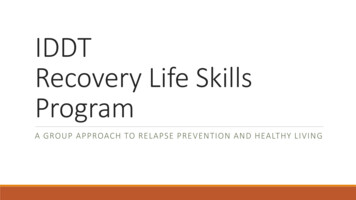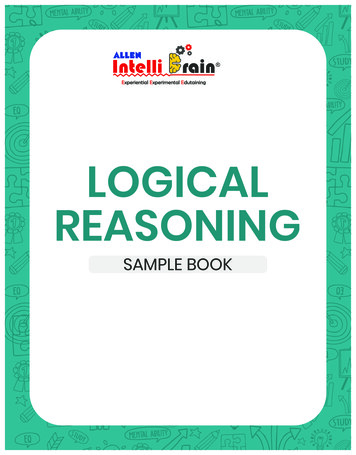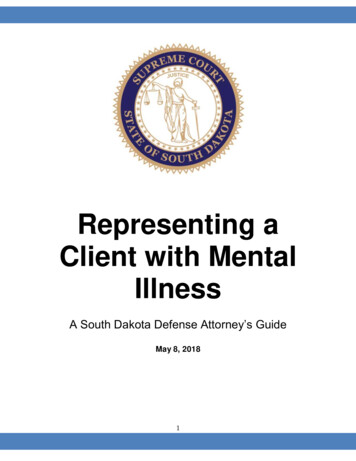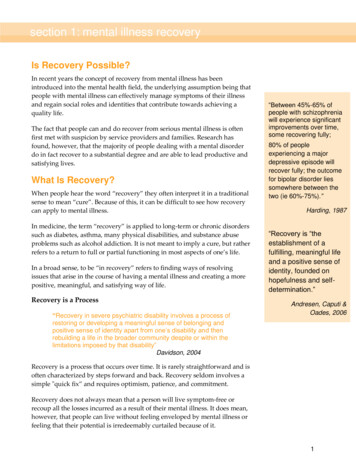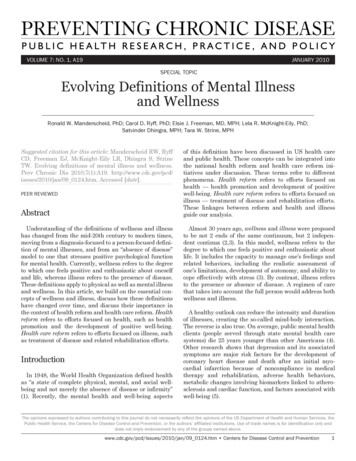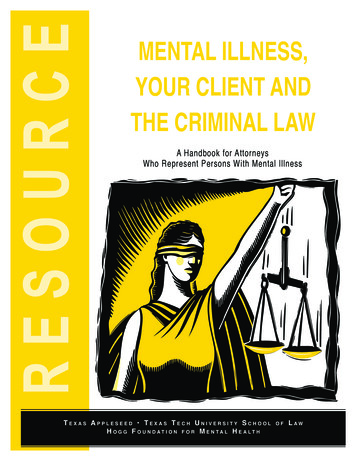
Transcription
ResourceMental Illness,Your Client andThe Criminal LawA Handbook for AttorneysWho Represent Persons With Mental IllnessTexas Appleseed Texas Tech University SchoolH o g g F o u n d at i o n f o r M e n ta l H e a lt hofLaw
AcknowledgmentsThis fourth edition handbook is made possible by the Hogg Foundation for Mental Health. Theoriginal handbook was supported by the Hogg Foundation for Mental Health, Houston Endowment,and the Meadows Foundation. We would like to thank the following people for their contributions tothis edition of the handbook: Brian Shannon, Jim Van Norman, M.D, Cindy Stormer, JeanetteKinard, Floyd Jennings, Ph.D., Beth Mitchell, Kathryn Lewis, David Gonzales, and Raman Gill. Aspecial thanks goes to Cindy Gibson with Disability Rights Texas for her review of Appendix B. Weacknowledge contributions to prior editions from Ken Arfa, M.D.; Jay Crowder, M.D.; Joel Feiner,M.D.; and attorneys Nathan Dershowitz, Lynda Frost, Ph.D., Alexandra Gauthier, JeanetteDrescher Green, Debbie Hiser, Barry Johnson, Corinne Mason, and John Niland, as well assupport from Reymundo Rodriguez and Jeff Patterson.Texas Appleseed1609 Shoal Creek, Suite 201Austin, Texas 78701tel: (512) 473-2800fax: (512) 473-2813website: www.texasappleseed.netTexas Appleseed presents the information in this handbook as a service to attorneys who represent defendants with mental illness. While we workedto provide accurate and up-to-date information, this handbook is not intended to provide legal advice. Non-lawyers should seek the advice of alicensed attorney in all legal matters. Texas Appleseed makes no warranties, express or implied, concerning the information contained in thishandbook or other resources to which it cites.
MENTAL ILLNESS, YOUR CLIENTAND THE CRIMINAL LAWA HANDBOOK FOR ATTORNEYS WHO REPRESENTPERSONS WITH MENTAL ILLNESSCreated and Distributed byTexas Appleseed with generous support from:Hogg Foundation for Mental HealthFourthEditionFourth EditionFebruary 22015February015
Report TeamFourthEditionJacques Ntonme, Hogg Legal Fellow, Texas AppleseedRebecca Lightsey, Executive Director, Texas AppleseedDeborah Fowler, Deputy Director, Texas AppleseedBrian D. Shannon, Charles “Tex” Thornton Professor of Law, Texas Tech University School of Law*Original EditionRaman Gill, Former Attorney, Texas Appleseed*Chris Siegfried, Consultant, Texas Appleseed*Brian D. Shannon, Charles “Tex” Thornton Professor of Law, Texas Tech University School of Law*Daniel H. Benson, Paul Whitfield Horn Professor of Law, Texas Tech University School of Law*George E. Dix, A.W. Walker Centennial Chair, The University of Texas School of Law*TEXAS APPLESEED MISSIONTexas Appleseed's mission is to promote social and economic justice for all Texans by leveraging the skills and resources ofvolunteer lawyers and other professionals to identify practical solutions to difficult, systemic problems. Texas Appleseed has workedon some of the state’s most pressing issues. Our work to improve the rights of poor people in the criminal justice system alerted usto the special needs of defendants with mental illness and their families. We hope this handbook will help attorneys who representdefendants with mental illness.Texas Appleseed Board OfficersGeorge Butts (Chair), George Butts Law**, AustinAllene D. Evans (Immediate Past Chair), The University of Texas System**, AustinNeel Lane (Secretary/Treasurer), Akin Gump Strauss Hauer & Feld LLP**, San Antonio*primary author of first edition**affiliations for identification onlyFourth Edition 2015 by Texas Appleseed. All rights are reserved except as follows: Free copies of this handbook may be made for personaluse. Reproduction of more than five (5) copies for personal use and reproduction for commercial use are prohibited without written permissionof the copyright owner. The work may be accessed for reproduction pursuant to these restrictions at www.texasappleseed.net.
TABLE OF CONTENTSAboutAbout ThisThis HandbookHandbookxx1TopTop TenTen ThingsThings toto KeepKeep inin MindMind AsAs YouYou RepresentRepresent aa ClientClient WithWith MentalMental IllnessIllnessxx2Mental HealthHealth ChecklistChecklist forfor DefenseDefense AttorneysAttorneysMentalxx4Section 1:1:SectionWhat IsIs MentalMental Illness,Illness, andand WhyWhy ShouldShould YouWhatYou Care?Care?xx 6Section 2:2:SectionThe FairFair DefenseDefense ActActThexx 8SectionSection 3:3:TheThe InitialInitial InterviewInterviewxx 9SectionSection 4:4:HelpfulHelpful HintsHints toto ObtainObtain InformationInformationxx12SectionSection 5:5:PretrialPretrial ProcessProcess andand OptionsOptionsxx15SectionSection 6:6:CompetenceCompetence EvaluationsEvaluations andand HearingsHearingsxx17Section 7:7:SectionMental ImpairmentImpairment asas aa DefenseDefenseMentalxx24SectionSection 8:8:UseUse ofof ExpertExpert MentalMental HealthHealth Witnesses,Witnesses, Mitigation,Mitigation, andand SentencingSentencing ndixAppendix A:A: GlossaryGlossary ofof CommonCommon MentalMental HealthHealth MedicationsAppendix B: Commonly Prescribed Psychotropic MedicationsAppendix C:C: ResourcesResources forfor HelpHelpAppendixAppendixD:TexasUniformHealth StatusStatus UpdateUpdate FormFormAppendix D: Texas Uniform HealthAppendix E:E: HealthHealth InformationInformation ReleaseRelease hartAppendix F: Compelled Medication Flowchartxxxxxxxxxxxx354046485052
ABOUT THIS HANDBOOKTexas Appleseed issued its Fair Defense Report: Analysis of Indigent Defense Practices in Texas 15 years ago. Our workto assess the condition of indigent persons in the criminal justice system revealed the special needs of defendants withmental illness and the inadequate representation they sometimes receive. Defense attorneys, like other court officials, oftenfailed to recognize mental illness. The Fair Defense Report revealed that, even when attorneys recognize clients asmentally ill, many attorneys are not familiar with the specialized mechanisms, procedures, and laws that apply to personswith mental illness. For instance, many attorneys are unfamiliar with competency statutes and procedures. This lack ofknowledge—together with concerns about the time and expense of conducting competency evaluations and, often, theclient’s desire to get out of jail quickly—may result in a client pleading guilty to an alleged offense when he or she is notcompetent to do so. When mental incapacity reduces the defendant’s ability to understand what is happening to him or heror to participate in his or her own defense, the basic fairness of the criminal trial process is threatened. Since publication ofthe Fair Defense Report, the processes for identification and treatment of defendants with mental illnesses have madesignificant strides: There are procedures in place for screening defendants at the jail and making referrals for furtherevaluation if necessary, competency issues amongst defendants are being identified at a much higher rate, and theprocesses for transitioning defendants out of competency restoration to trial or discharge have been vastly improved.However, some shortcomings in the treatment and representation of mentally ill defendants persist. A continued lack ofunderstanding of mental illness and treatment options contribute significantly to delays in competency restoration, harshersentences, longer stays in jail, and frequent revocations of probation for mentally ill defendants.This handbook was developed to improve legal representation for criminal defendants with mental illness. It was drafted andreviewed by both mental health professionals and attorneys experienced in criminal and mental health law. However, it is nota comprehensive guide on mental health law or on how to represent a mentally ill defendant. It does not address the law as itrelates to juvenile defendants with mental illness. It is designed to give attorneys a starting point for their work with theiradult clients who have a mental illness, to alert them to some basic legal options they may want to consider, and to givethem some ideas about where to go for assistance.We hope this handbook encourages attorneys who represent defendants with mental illness to go the extra mile for theirclients. It could make all the difference.1
TOP TEN THINGS TO KEEP IN MIND AS YOUREPRESENT A CLIENT WITH MENTAL ILLNESS1. MENTAL ILLNESS AND INTELLECTUAL AND DEVELOPMENTAL DISABILITIES ARE NOT THE SAME: Intellectual ordevelopmental disabilities are permanent conditions characterized by significantly below average intelligence accompanied bysignificant limitations in certain skill areas, with onset before age 18. Mental illness, on the other hand, usually involvesdisturbances in thought processes and emotions and may be temporary, cyclical, or episodic. Most people with mental illnessdo not have intellectual deficits; some, in fact, have high intelligence. It is possible for a person with an intellectual ordevelopmental disability to also have a mental illness. Many of the Texas statutes that address mental illness also addressintellectual and developmental disabilities, and you should look carefully at those statutes for the differences in how the two areaddressed. This handbook does not address intellectual and developmental disabilities.2. YOU OWE YOUR CLIENT A ZEALOUS REPRESENTATION: You have the ethical obligation to zealously representyour client, which may include exploring your client’s case for mental health issues. It may also include bringing appropriatemotions if your client’s mental illness has affected his or her case in any of the ways discussed in Section 1 of thishandbook.3. IF YOUR CLIENT IS INCOMPETENT, STOP AND ORDER AN EVALUATION: If your client is incompetent, he or she maynot be able to make informed decisions about fundamental issues, such as whether or not to enter into a plea bargainagreement or, instead, proceed to trial. Do not allow your client to accept a plea bargain, or make any other decisionsregarding the case, when you have reason to believe that he or she is incompetent. Instead, immediately request acompetency evaluation.4. MENTAL ILLNESS AND INCOMPETENCE ARE NOT SYNONYMOUS, AND YOU SHOULD BE CONCERNEDABOUT BOTH: Keep in mind that competence to stand trial is distinct from mental illness. Some clients who are fit toproceed to trial may still have serious mental illness. Even if your client does not have a competence issue, there may still besignificant mental health issues in the case that you should explore. Remember, however, that if your client is competent tostand trial, he or she makes the final decision about how to proceed with the case, whether or not to explore mental healthissues, and whether treatment should be part of a disposition.5. AN INSANITY DEFENSE MAY BE APPROPRIATE: By taking the time to properly inquire about your client’s mentalillness and to explore various legal and medical options, you may obtain information that will help you decide if you shouldexplore an insanity defense. If your client receives a not guilty by reason of insanity verdict, he or she will avoid receivingan unjust conviction. However, as discussed further in Section 7 of this handbook, there may be disadvantages to pursuingthe insanity defense, and you should discuss all of the pros and cons with your client.6. MITIGATE, MITIGATE, MITIGATE: Mental conditions that inspire compassion, without justifying or excusing the crime,can be powerful mitigation evidence. Part of your job as an attorney is to present the judge or jury with evidence thatreveals your client as someone with significant impairments and disabilities that limit his or her reasoning or judgment.Mitigation evidence can be used to argue for a shorter term of incarceration or for probation instead of incarceration. Incapital cases, mental illness and mental health testimony may mean the difference between life and death.7. INEFFECTIVE ASSISTANCE OF COUNSEL AND REVERSIBLE ERROR: An attorney’s failure to request theappointment or otherwise obtain the assistance of qualified mental health or mental rehabilitation professionals whenindicated can be a violation of a defendant’s Sixth Amendment right to effective assistance of counsel. This certainlyapplies to capital cases but also to other homicide cases and any alleged offense that suggests mental aberration. Adefendant’s prior history of mental impairment may indicate that you need the assistance of a professional evaluation. Ake2
v. Oklahoma, 470 U.S. 68 (1985). Ake also confirms the right of indigent, convicted defendants to the assistance of mentalhealth professionals at sentencing proceedings. An appellate judge may find reversible error if a client is truly incompetentor insane and the issue is not raised in court.8. OVERCOME YOUR OWN PREJUDICES BEFORE YOU HURT YOUR CLIENT AND HIS OR HER CASE: A popularmisconception is that mental-state defenses are attempts by the defendant to “get off” or deny responsibility for theirbehavior. Many people are skeptical that persons with mental illness, in contrast to those with intellectual and developmentaldisabilities, are in some circumstances unable to fully appreciate the nature of their acts and control them. This denial ofpsychiatric disability can deeply influence the attitudes of both judges and juries toward expert witnesses and mentalhealth defenses. Part of your job, if you are representing a person with mental illness, is to overcome cynicism towardmental health issues in criminal cases. Mental illnesses are neurobiological brain diseases. A mental illness is a medicalillness, not “hocus pocus,” and the people who experience it suffer profoundly. Mental illness can be diagnosed, treated, andsometimes even cured. You do your client a disservice by representing it any other way.9. INCARCERATION IS PARTICULARLY HARMFUL TO PEOPLE WITH MENTAL ILLNESS: Jails can be very damaging tothe stability, mental health, and physical health of individuals with mental illness. Numerous studies show that placingmentally ill persons in single cells, isolation, or “lock down” can worsen their schizophrenia, depression, and anxiety.Individuals with mental illnesses or intellectual and developmental disabilities are also more likely than others to bevictimized by other inmates or jail staff. They are at high risk for suicide. They may get inadequate, if any, medication andtreatment while in jail. As set out in Section 5 of this handbook, you should seek to get your client’s case dismissed quicklyand, if appropriate, try to get your client released on bond.10. DO NOT LET YOUR CLIENT GET CAUGHT IN THE “REVOLVING DOOR”: Many adults with mental illness arearrested for minor offenses that directly relate to their illness, poverty, or disturbed behavior. They cycle repeatedly through thecourts and jails, charged with the same petty offenses. This "revolving door" is not only a burden to the courts and thecriminal justice system, but it is also costly to society, to these individuals, and to their families. By quickly pleading yourclient to "time served" without exploring his or her mental illness, you may lose the opportunity to help your client get betterso that he or she does not re-offend. Attorneys should do their best to link mentally ill defendants to appropriate treatment orservices that will help them keep out of trouble. While it is important to get your client out of jail as soon as possible, it isequally important to keep him or her from returning to jail. Releasing persons with mental illness back into the communitywith no plan for treatment or aftercare is a recipe for revocation and recidivism. Don’t set up your client to fail.3
Mental Health Checklist for Defense tfor Defensefor DefenseAttorneysAttorneysINITIAL STEPSINITIAL STEPSINITIAL STEPS1. Ask the client questions to determine the mental illness diagnosis.1. Ask the 1.clientAskquestionsthe client toquestionsdetermineto determinethe mental theillnessmentaldiagnosis.illness diagnosis. Interview the client as soon as possible. Interview theInterviewthesoonclientasaspossible.soon as possible.Ask abouttheclientfacts asofthecase. Ask aboutAskthe whetherfactsaboutofthethecase.of hasthe case.the clienthefactsorshebeen treated for any type of mental illness. Askthe medicalclientAskwhethertheclientheifwhetherorshe hashe orbeenshetreatedhasabeenfor treatedanythese.typeforofanymentaltypeillness.of mental illness.Reviewrecordsavailable.Youhaverightto Review medicalReviewrecordsmedicalif available.recordsYouavailable.haveaYourighthaveto these.a right to these.Ask whetherhe orshe tookspecial ifclassesin school. Askhewhetheror she tookhe orspecialshe tookclassesspecialin school.classes in school.Talk whetherto the Askfamily. Talkto thewitnesses.Talkfamily.to the family.Interview InterviewInterviewwitnesses.Inform thewitnesses.client of hisor her right to a jury trial or a trial before the court and the right to be present at hearings. Inform the Informclient ofthehisclientor herofrighthis ortohera juryrighttrialto ora jurya trialtrialbeforeor a trialthe beforecourt andthethecourtrightandtothebe rightpresentto beat presenthearings.at hearing2. Get the client out of jail on bond, if possible. Review Tex. Code Crim. Proc. art. 16.22 (Early Identification of Defendant2.Get the client2.ofGetouttheofclientjail onoutIllnessbond,of jailiforonpossible.bond, m.CodeProc.Crim.art.on16.22Proc.(Earlyart. easePersonalBondof CertainIll DefendantSuspectedSuspectedof1 Having Mentalof HavingIllnessMentalor MentalIllnessRetardation)or Mental Retardation)and sonalof CertainBond Mentallyof CertainIllMentally IllDefendants).11Defendants).Defendants).3. Familiarize yourself with options available in your community. Talk to mental health professionals, public defenders that3.Familiarize3. bleoptionsinavailableyour community.in your community.Talk to mentalTalkhealthto mentalprofessionals,health professionals,public defenderspublic defendersthatthatspecializeinhealth,etc. withspecialize inspecializemental health,in mentaletc.health, etc.4. Mentally ill individuals can be placed on probation or promised conditional dismissals with requirements, including but not4.Mentallyindividualsill individualscan be placedcan onbe probationplaced onorprobationpromisedorconditionalpromised conditionaldismissals dismissalswith requirements,with requirements,including butincludingnot but nlimitedto: 4.ill Mentallylimited to: limited to:(1) staying on their medications;(1) staying (1)on stayingtheir medications;on their medications;(2) not consuming illegal drugs or alcohol (as they may exacerbate an underlying mental condition or reduce efficacy(2) notmedications);consuming(2) not consumingillegal drugsillegalor alcoholdrugs (asor alcoholthey may(asexacerbatethey may exacerbatean underlyingan underlyingmental conditionmentalorconditionreduce efficacyor reduce efficacof prescribedof prescribedof prescribedmedications);medications);(3) seeing mental health professionals; and(3) seeing (3)mentalseeinghealthmentalprofessionals;health professionals;andand(4) seeing case managers who can obtain supportive housing, transportation, etc., for them.(4) seeing (4)caseseeingmanagerscase managerswho can obtainwho cansupportiveobtain supportivehousing, transportation,housing, transportation,etc., for them.etc., for them.5. An attorney who is appointed or retained to represent a special needs offender or a juvenile with a mental impairment can5.An attorney5. Anwhoattorneyis appointedwhoforis theorappointedretainedortoretainedrepresentto arepresentspecialspecialneedsorAFETYoffendera juvenileor witha§ juvenilea mentalwithimpairmenta mental impairmentcanc. tionpurposesofcontinuityof care.needsTaEXdisclose medicaldiscloseinformationmedical informationfor the purposesfor theofpurposescontinuityof ofcontinuitycare. TEXof. Hcare.EALTHTEX& .SHAFETYEALTHC&ODESAFETY§ 614.017.CODE § 614.017.6. If your client was arrested without a warrant, look at Texas Health and Safety Code section 573.001 which requires that6.If your client6. Ifpersonsyourwas arrestedclientwithoutarresteda warrant,withoutalookwarrant,lookHealthat ch573.001requireswhichthatrequires thatapprehendedwithwasmentalillnessbe na jailCodefacilityin ahealthmentalfacilityhealthinsteadfacilityof ainsteadjail facilityof a injailcertainfacilityin certainsituations.JailJapersonnel mayhave theauthoritytoillnessdivertthetakenclienttobetoa amentalmentalfacility.Askdetentionpersonnelif the situations.clientcan vethetoauthoritydivert thetoclientdiverttothea mentalclient tohealtha nneldetention ifpersonnelthe clientifcanthe beclient can bemoved to amaymedicalif appropriate.moved to amovedmedicalto facility,a medicalif appropriate.facility, if appropriate.7. Familiarize yourself with civil commitments if applicable.7. Familiarize7. Familiarizeyourself withyourselfcivil commitmentswith civil commitmentsif applicable.if applicable.1 “A written assessment of the information collected . . . shall be provided to the magistrate not later than the 30th day after the date of any order. . . inassessmentfelonycaseandinformationnot laterthanthe 10thafterorderissued.magistrate. later. in “A“A writtenwrittenofassessmenttheof thecollectedinformation. . day. collectedshallbe theprovided. . .dateshalloftobeanytheprovidedmagistrateto ateafterof anytheorderdateany orderprovide. copiesthe. .writtenassessmentto ODEandCRIMthe. case,PmagistrateROC.andart. the16.22.issued. . in issueda offelonycase. in aandfelonynotcaselater edaydateafterof anytheorderdateissuedof anyandorder. . .thein issuedatrialmisdemeanor. . . inTaEXmisdemeanorshallmagistrate eon personalbond of esprovidetheCodecopieswrittenofofassessmentthe writtentoassessmentthe defenseto counsel,thefordefensethe counsel,prosecutingthe attorney,prosecutingandattorney,thementallytrial court.”andilltheTtrialTEXEX. Ccourt.”ODE C“ARIM.PCROCODE. Cart.RIM16.22. PreleaseROC. art. 16.22.a erwisethedefendantis ofnotcertainchargedwithandhasnot beenof a shall bondofof CriminaltheCodegoodProcedureof n personalbondmentallyofcertainill defendants.mentallyill allmagistratereleaseRIM. PROC. art.unless17.032(b).violentoffense.”TEX. CODEa defendantona eisgoodshowncauseotherwiseis shownif theotherwisedefendantif theis defendantnot chargedis withnot chargedand has withnot beenand haspreviouslynot beenconvictedpreviouslyof aconvicted o. CODE CRIMODE. Cart.RIM17.032(b). PROC. art. 17.032(b).violent offense.”violentTEXoffense.”TEX.PCROC4
personnel may have the authority to divert the client to a mental health facility. Ask detention personnel if the client can be8. Familiarizeyourselfwith “Dutiesof Attorney.” TEX. HEALTH & SAFETY CODE § 574.004.movedto a medicalfacility,if appropriate.9. FamiliarizeExplain youryourselfclient’swithabsenceto the court atifmeetingsor hearings. Determine if you need an independent psychiatric7.civil selfwith“Dutiesof Attorney.” TEX. HEALTH & SAFETY CODE § 574.004.1 “A written assessment of the information collected . . . shall be provided to the magistrate not later than the 30th day after the date of any orderCOMPETENCYissued. . . inyoura felonycase andnot latertothan10thatdayafter the dateof any orderissued . . . ina misdemeanorcase, and the magistrateshall9. Explainclient’sabsencethethecourtmeetingsor hearings.Determineif youneed an independentpsychiatricprovide copies of the written assessment to the defense counsel, the prosecuting attorney, and the trial court.” TEX. CODE CRIM. PROC. art. 16.22.Considerevaluation.an evaluation for incompetency. This may be the best way to begin treatment services for the client. Review articleArticle 17.032 of the Code of Criminal Procedure provides for release on personal bond of certain mentally ill defendants. “A magistrate shall releaseotherwise if the defendant is not charged with and has not been previously convicted of aof the ndgoodProcedure.cause is shownCOMPETENCYviolent offense.” TEX. CODE CRIM. PROC. art. 17.032(b).When a doctor has determined that an individual is incompetent, the certificates of medical examination are valid for 30Considerevaluationfor incompetency.This maybe thebest way to begintreatmentservicesthe client.Review. HEALTH& SAFETYCODE § 574.066(c).HAVEA COMPETENCYHEARINGWITHIN30forDAYSOF THEDAY articleOFdays. TEXan46BoftheTexasCodeofCriminalProcedure.THE EVALUATION (not the day of the report). Failure to do so will result in unnecessary delays, incarceration for the client,anddispleasureof thejudge. that an individual is incompetent, the certificates of medical examination are valid for 30Whena doctor hasdetermined& SAFETYconsiderCODE § alternatives574.066(c). HAVECOMPETENCYHEARINGWITHIN(OCR)30 DAYSOFcommitmentTHE DAY OFTEX. HisEALTHIfdays.the clientincompetent,such asA outpatientcompetencyrestorationor ortheclient,return for a dismissal. Under OCR, “the court shall order a defendant released on bail under subsection (a-1) to participate inandoutpatientdispleasureof the judge.antreatmentprogram for a period not to exceed 120 days.” TEX. CODE CRIM. PROC. art. 46B.072(b) (emphasis.Underdiversion to civilcommitment,a prosecutormay agreecompetencyto dismiss thecase basedon orthecivilclient’smental healthIfadded)the clientis incompetent,consideralternativessuch as eturn for a dismissal. Under OCR, “the court shall order a defendant released on bail under subsection (a-1) to participate inan outpatient treatment program for a period not to exceed 120 days.” TEX. CODE CRIM. PROC. art. 46B.072(b) (emphasisDefendants committed on misdemeanor cases can be held for a maximum of two years; misdemeanors shall be dismissed if.Under diversion to civil commitment, a prosecutor may agree to dismiss the case based on the client’s mental healthadded)the defendantis not tried before the second anniversary of the date on which the order of commitment was entered. TEX.commitment.CODE CRIM. PROC. art. 46B.010.DefendantsINSANITY committed on misdemeanor cases can be held for a maximum of two years; misdemeanors shall be dismissed ifthe defendant is not tried before the second anniversary of the date on which the order of commitment was entered. TEX.Consideran. Pevaluationfor insanity. Review article 46C of the Texas Code of Criminal Procedure. If the client was insane atCODE CRIMROC. art. 46B.010.the time of the offense, give timely notice of intent to raise an insanity defense to the State no less than 20 days prior to theINSANITYtrial. TEX. CODE CRIM. PROC. art. 46C.051(b)(2). Advise the client that the court will continue to have jurisdiction over the2client.Consider an evaluation for insanity. Review article 46C of the Texas Code of Criminal Procedure. If the client was insane atthe time of the offense, give timely notice of intent to raise an insanity defense to the State no less than 20 days prior to thetrial. TEX. CODE CRIM. PROC. art. 46C.051(b)(2). Advise the client that the court will continue to have jurisdiction over theclient.2“The jurisdiction of the court over a person [found not guilty by reason of insanity] automatically terminates on the date when the cumulative totalperiod of institutionalization and outpatient or community-based treatment and supervision imposed . . . equals the maximum term of imprisonmentprovided by law for the offense of which the person was acquitted by reason of insanity.” TEX. CODE CRIM. PROC. art. 46C.269.2“The jurisdiction of the court over a person [found not guilty by reason of 5insanity] automatically terminates on the date when the cumulative totalperiod of institutionalization and outpatient or community-based treatment and supervision imposed . . . equals the maximum term of imprisonment2
1SECTION111SSECTIONECTIONECTIONWHAT IS MENTAL ILLNESS AND WHY SHOULD YOU UYOUYOUCARE?CARE?CARE?WHAT IS MENTAL S?ILLNESS?ILLNESS?The Texas Mental Health Code, which is part of the Texas Health and Safety Code, defines mental illness as “an partis s,illness,disease,or ldeficiency,that:disea
This handbook was developed to improve legal representation for criminal defendants with mental illness. It was drafted and reviewed by both mental health professionals and attorneys experienced in criminal and mental health law. However, it is not a comprehensive guide on mental health law or on how to represent a mentally ill defendant.

